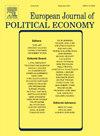不平等、阴谋论和再分配
IF 2.4
3区 经济学
Q2 ECONOMICS
引用次数: 0
摘要
尽管不平等迅速加剧,但再分配并不一定会扩大。我通过强调不平等对阴谋论接受度的新影响来解决这个悖论。为此,我开发了一个选举竞争模型,其中选民分为富人和穷人。每位选民都在维护自我形象的愿望与对准确信念的需求之间进行权衡,导致对阴谋论的不同支持。在该模型中,更大的不平等导致穷人更强烈地相信阴谋论。因此,贫穷的选民可以寻求更多的改革来击败阴谋和降低所得税。我表明,当最初的不平等程度很高,税收扭曲程度很大时,更大的不平等矛盾地减少了所得税。在阴谋论盛行的阴影下,民主可能无法抵御日益加剧的不平等。本文章由计算机程序翻译,如有差异,请以英文原文为准。
Inequality, conspiracy theories, and redistribution
Despite a rapid increase in inequality, redistribution does not necessarily expand. I address this paradox by emphasizing a novel effect of inequality on the acceptance of conspiracy theories. For this purpose, I develop an electoral competition model in which voters are divided into rich and poor. Each voter weighs the desire to maintain their self-image against the need for accurate beliefs, leading to varied endorsements of conspiracy theories. In the model, greater inequality leads the poor to believe more strongly in conspiracy theories. As a result, poor voters can seek more reforms to defeat conspiracies and lower income taxation. I show that greater inequality paradoxically reduces income taxation when the initial inequality is high and the distortion of taxation is large. In the shadow of prevalent conspiracy theories, democracy may fail to act as a protector against rising inequality.
求助全文
通过发布文献求助,成功后即可免费获取论文全文。
去求助
来源期刊

European Journal of Political Economy
Multiple-
CiteScore
3.40
自引率
10.00%
发文量
106
期刊介绍:
The aim of the European Journal of Political Economy is to disseminate original theoretical and empirical research on economic phenomena within a scope that encompasses collective decision making, political behavior, and the role of institutions. Contributions are invited from the international community of researchers. Manuscripts must be published in English. Starting 2008, the European Journal of Political Economy is indexed in the Social Sciences Citation Index published by Thomson Scientific (formerly ISI).
 求助内容:
求助内容: 应助结果提醒方式:
应助结果提醒方式:


